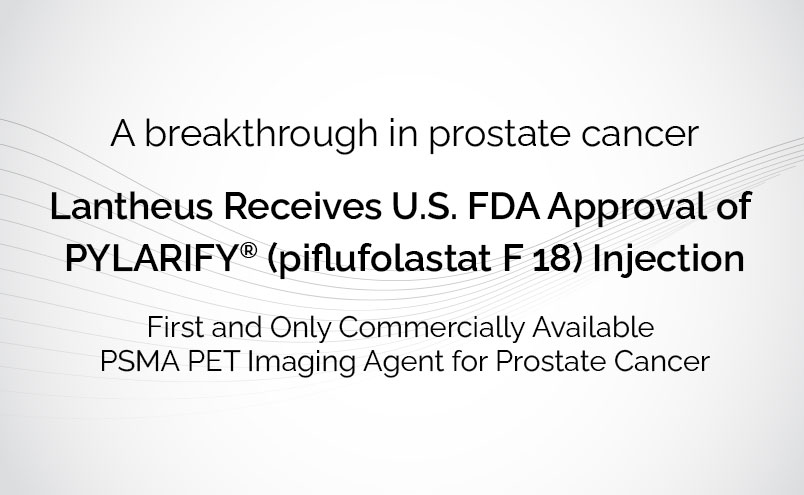SOFIE, an established Radiopharmaceutical Contract Manufacturing Organization and GMP radiopharmacy network, will be commercially manufacturing and distributing PYLARIFY® (piflufolastat F 18) injection, an F 18-labeled prostate-specific membrane antigen (PSMA) targeted positron emission tomography (PET) imaging agent. With the recent announcement of the U.S. Food and Drug Administration (FDA) approval, SOFIE will provide a dependable and scalable manufacturing and distribution network to support Lantheus’ PSMA-targeted product PYLARIFY. Under a commercial supply agreement with Lantheus, SOFIE will roll out PYLARIFY via its national network, which has manufactured numerous PYLARIFY doses for Lantheus during the clinical trials.
SOFIE’s Vice President of Sales & Marketing, Mike Parisi, states, “We are thrilled to partner with Lantheus to commercially supply this new and innovative prostate cancer imaging agent. We intend to scale our F-18 production as needed to help meet the anticipated widespread market demand. This not only enables us to reach a vast geographic region, but it also allows us to provide increased availability of the product throughout the day, to improve efficiency and throughput for our customers and the patients they serve.”
Brian Schumer, SOFIE Chief Operating Officer, “We are very excited to support the first and only commercially available PSMA PET prostate cancer imaging agent. SOFIE’s network will help meet the expected commercial demand for PYLARIFY by leveraging our expertise, experience, and distribution capabilities to successfully help serve the U.S. prostate cancer community. SOFIE is actively investing in additional resources and expanding our network to support the anticipated demand of PYLARIFY.”
Read the Lantheus press release here.
About SOFIE
SOFIE’s vision is to improve patient outcomes by developing and delivering molecular diagnostics and therapeutics (Theranostics). With its robust radiopharmaceutical production and distribution network, mature contract manufacturing services, and now, high value Theranostic intellectual property, SOFIE is poised to deliver on the promise of nuclear medicine. For more information, please visit https://sofie.com or contact info@sofie.com
About PYLARIFY®
PYLARIFY (piflufolastat F 18) injection (also known as 18F-DCFPyL or PyL) is a fluorinated small molecule PSMA-targeted PET imaging agent that enables visualization of lymph nodes, bone and soft tissue metastases to determine the presence or absence of recurrent and/or metastatic prostate cancer. For men with prostate cancer, PYLARIFY PET combines the accuracy of PET imaging, the precision of PSMA targeting and the clarity of an F 18 radioisotope for superior diagnostic performance. The recommended PYLARIFY dose is 333 MBq (9 mCi) with an acceptable range of 296 MBq to 370 MBq (8 mCi to 10 mCi), administered as a bolus intravenous injection.1-9
About Prostate Cancer
Prostate cancer is the second most common form of cancer affecting men in the United States — an estimated one in eight men will be diagnosed with prostate cancer in their lifetimes. The American Cancer Society estimates that in 2021, almost 250,000 new cases of prostate cancer will be diagnosed, and more than 30,000 men will die of the disease. Approximately 3.1 million men in the United States currently count themselves as prostate cancer survivors.10
PYLARIFY® (piflufolastat F 18) Injection
Indication
PYLARIFY® (piflufolastat F 18) Injection is a radioactive diagnostic agent indicated for positron emission tomography (PET) of prostate-specific membrane antigen (PSMA) positive lesions in men with prostate cancer:
• with suspected metastasis who are candidates for initial definitive therapy.
• with suspected recurrence based on elevated serum prostate-specific antigen (PSA) level.
Important Safety Information
Contraindications
None.
Warnings and Precautions
Risk of Image Misinterpretation
Imaging interpretation errors can occur with PYLARIFY imaging. A negative image does not rule out the presence of prostate cancer and a positive image does not confirm the presence of prostate cancer. The performance of PYLARIFY for imaging of patients with biochemical evidence of recurrence of prostate cancer seems to be affected by serum PSA levels. The performance of PYLARIFY for imaging of metastatic pelvic lymph nodes prior to initial definitive therapy seems to be affected by risk factors such as Gleason score and tumor stage. PYLARIFY uptake is not specific for prostate cancer and may occur with other types of cancer as well as non-malignant processes and in normal tissues. Clinical correlation, which may include histopathological evaluation of the suspected prostate cancer site, is recommended.
Hypersensitivity Reactions
Monitor patients for hypersensitivity reactions, particularly patients with a history of allergy to other drugs and foods. Reactions may be delayed. Always have trained staff and resuscitation equipment available.
Radiation Risks
Diagnostic radiopharmaceuticals, including PYLARIFY, expose patients to radiation. Radiation exposure is associated with a dose-dependent increased risk of cancer. Ensure safe handling and preparation procedures to protect patients and health care workers from unintentional radiation exposure. Advise patients to hydrate before and after administration and to void frequently after administration.
Adverse Reactions
The most frequently reported adverse reactions were headaches, dysgeusia and fatigue, occurring at rate of ≤2% during clinical studies with PYLARIFY. In addition, a delayed hypersensitivity reaction was reported in one patient (0.2%) with a history of allergic reactions.
Drug interactions
Androgen deprivation therapy (ADT) and other therapies targeting the androgen pathway, such as androgen receptor antagonists, may result in changes in uptake of PYLARIFY in prostate cancer. The effect of these therapies on performance of PYLARIFY PET has not been established.
To report suspected adverse reactions for PYLARIFY, call 1-800-362-2668 or contact FDA at 1-800-FDA-1088 or www.fda.gov/medwatch.
For important risk and use information about PYLARIFY Injection, please see Full Prescribing information.
- Mena et al. 18 F-DCFPyL PET/CT Imaging in Patients with Biochemically Recurrent Prostate Cancer After Primary Local Therapy J Nucl Med 2020 Jun;61(6):881-889. doi: 10.2967/jnumed.119.234799. Epub 2019 Nov
- Alipour et al. Guiding management of therapy in prostate cancer: time to switch from conventional imaging to PSMA PET? Ther Adv Med Oncol. 2019; 11: 1758835919876828.
- Taneja Imaging in the Diagnosis and Management of Prostate Cancer Rev Urol. 2004 Summer; 6(3): 101–113.
- Ceci & Fanti. PSMA-PET/CT imaging in prostate cancer: why and when. Clinical and Translational Imaging volume 7, pages377–379 (2019).
- Werner et al 18F-Labeled, PSMA-Targeted Radiotracers: Leveraging the Advantages of Radiofluorination for Prostate Cancer Molecular Imaging Theranostics 2020; 10(1):1-16. doi:10.7150/thno.37894.
- Martiniova et al. Gallium-68 in Medical Imaging Curr Radiopharm 2016;9(3):187-207. doi: 10.2174/1874471009666161028150654.
- Petersen LJ, Zacho HD. PSMA PET for primary lymph node staging of intermediate and high-risk prostate cancer: an expedited systematic review. Cancer Imaging. 2020;20(1):1-8. doi:10.1186/s40644-020-0290-
- Tan N, Oyoyo U, Bavadian N, et al. PSMA-targeted radiotracers versus 18F fluciclovine for the detection of prostate cancer biochemical recurrence after definitive therapy: a systematic review and meta-analysis. Radiology. 2020;296:44-55. doi:10.1148/radiol.2020191689
- PYLARIFY® [package insert]. North Billerica, MA: Progenics Pharmaceuticals, Inc., a Lantheus company
- American Cancer Society. Facts & Figures 2021. American Cancer Society. Atlanta, GA. 2021.



![SOFIE Biosciences Announces First Patient Dosed in [18F]FAPI-74 Phase 3 Study](https://sofie.com/wp-content/uploads/2025/12/P4_SOFIE_image-for-news-post-on-website-500x383.jpg)
![SOFIE activates FAPI-PRO, second [18F]FAPI-74 Phase 3 trial](https://sofie.com/wp-content/uploads/2025/12/FAPI_SOFIE-500x383.jpg)
![SOFIE activates FAPI-GO, first [18F]FAPI-74 Phase 3 trial](https://sofie.com/wp-content/uploads/2025/11/SOFIE_FAPI2-500x383.jpg)
